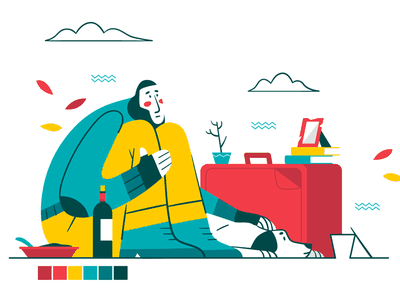|
In the early days of the pandemic, social, economic, and health inequities became painfully clear to many who may not have had such awareness prior. As businesses and public places began shutting down, the country heavily relied on frontline workers. Communities of color have been hit the hardest by the pandemic, with numbers in Chicago showing that Black and Latinx communities have suffered the biggest impacts (Yoon-Ji Kang, Moore, & Zamudio, 2020). However, much of the data available to us about the impacts of COVID-19 fails to include information about individuals experiencing homelessness. This failure is due in part to the fact that “the U.S. Department of Housing and Urban Development, the main federal agency overseeing homeless programs, has not required its national network of providers to gather information on infections or deaths” (Bohannon et al., 2020). This does not allow us to have a full picture of the impacts that the pandemic has had on people experiencing homelessness, a population already not given sufficient public attention. According to Rodriguez and colleagues (2021), people experiencing homelessness “face disproportionate rates of underlying health conditions and substance use disorders, stigma, and marginalization that often disenfranchise them from health and social services.” During the pandemic, these effects are only exacerbated, with COVID-related lockdown measures creating a disruption to resources for many people experiencing homelessness (Rodriguez et al., 2021). Further, following strict COVID-19 guidelines can be harder in shelter settings where social distancing is not always possible and resources are not always present. Access to medical care, testing, and vaccination against COVID-19 are also important factors to consider when it comes to individuals experiencing homelessness. An estimate from the US Interagency Council on Homelessness claims that approximately 15,000 people experiencing homelessness contracted COVID in 2020, and that about 250 homeless individuals died as a result of COVID-19 that same year (Rodriguez et al., 2021). However, these numbers are simply estimates because, as mentioned previously, there is no concerted effort to collect data on homeless populations. This does not allow us to give full recognition to the impacts of COVID-19 on people experiencing homelessness, and therefore, makes it more difficult to respond accordingly. Effective pandemic responses must prioritize individuals experiencing homelessness, who are at greater risk for COVID infection and community transmission (Rodriguez et al., 2021). Vaccination efforts should also prioritize individuals experiencing homelessness, with homeless service providers having a direct voice in conversations around how to best serve these communities. While $4 billion dollars was allocated to support homeless populations as part of the CARES Act, the disbursement of these funds has proven difficult, with less than 30% of those funds reaching individuals in need (Rodriguez et al., 2021). This serves as yet another barrier in an already uneven playing field. Moving forward, it is incredibly important that special attention and space is given to the voices and experiences of those facing homelessness not only during the pandemic, but beyond the pandemic as well. References Bohannon, M., Surma, K., Fast, A., Abdaladze, N., Lupo, M., Fields, J., Garg, S. (2020, August 24). COVID-19 is ‘a crisis within a crisis’ for homeless people. PBS News Hour. https://www.pbs.org/newshour/nation/covid-19-is-a-crisis-within-a-crisis-for-homeless- people Rodriguez, N.M., Lahey, A.M., MacNeill, J.J., Martinez, R.G., Teo, N.E., & Ruiz, Y. (2021). Homelessness during COVID-19: Challenges, responses, and lessons learned from homeless service providers in Tippecanoe county, Indiana. BMC Public Health, 21. https://doi.org/10.1186/s12889-021-11687-8 Yoon-Ji Kang, E., Moore, N., & Zamudio, M.. (2020). “A Perfect Storm: 50 Lives in 4 Zip Codes Tell Chicago’s Story of COVID-19 Inequality.” WBEZ, https://www.wbez.org/stories/a-perfect-storm-50-lives-and-4-zip-codes-tell-chicagos- story-of-covid-19-inequality/50b822ae-523e-47fa-a823-3c6a1c3ee12f
1 Comment
|
BLogArchives
July 2024
Categories |
©2022 Chicago HOPES for Kids. All Rights Reserved.
Website by Gumbo Media
Website by Gumbo Media


 RSS Feed
RSS Feed
